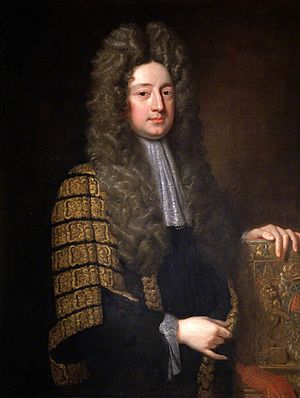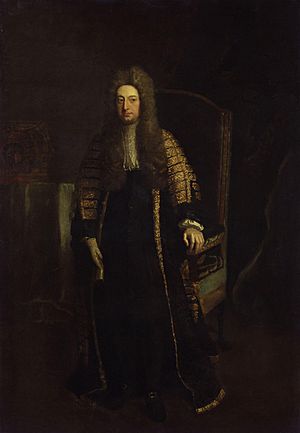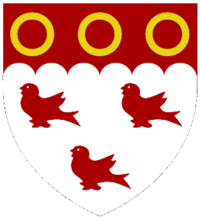William Cowper, 1st Earl Cowper facts for kids
Quick facts for kids
The Earl Cowper
|
|
|---|---|

Portrait by Jonathan Richardson
|
|
| Lord High Chancellor of Great Britain Lord High Steward for the trials of: |
|
| In office 4 May 1707 – 23 September 1710 |
|
| Monarch | Anne |
| Preceded by | Himself (as Lord Keeper of the Great Seal of England) |
| Succeeded by | In Commission |
| In office 21 September 1714 – 15 April 1718 |
|
| Monarch | |
| Preceded by | The Lord Harcourt |
| Succeeded by | In Commission |
| Lord Keeper of the Great Seal of England | |
| In office 11 October 1705 – 4 May 1707 |
|
| Monarch | Anne |
| Preceded by | Sir Nathan Wright |
| Succeeded by | Himself (as Lord High Chancellor of Great Britain) |
| Personal details | |
| Born | c. 1665 |
| Died | 10 October 1723 Panshanger, Hertfordshire Great Britain |
| Children |
|
| Parents |
|
| Relatives |
|
William Cowper, 1st Earl Cowper (born around 1665, died 10 October 1723) was an important English politician. He became the very first Lord High Chancellor of Great Britain. This was a top legal and political job. William Cowper was the son of Sir William Cowper, who was also a Member of Parliament. His family was part of the Whig political group.
Contents
William Cowper's Early Life and Career
William Cowper went to St Albans School in Hertfordshire. Later, he bought a large country home in the same area. He also represented the county town in Parliament.
Becoming a Lawyer
He began studying law at Middle Temple in 1681. He became a lawyer in 1688. He quickly became a very successful lawyer. When Prince William of Orange arrived in England in 1688, Cowper supported him. In 1694, he became a King's Counsel (a senior lawyer) and a judge for Colchester.
A Powerful Speaker
William Cowper was known as one of the best speakers in Parliament during his time. People listened carefully when he spoke. He lost his seat in Parliament in 1702. This was because of an event involving his brother, Spencer Cowper, which made him unpopular.
Key Roles and Titles
William Cowper held several very important positions in the government. These roles helped shape the laws and future of Great Britain.
Lord Keeper of the Great Seal
On 11 October 1705, he joined the Privy Council. This is a group of advisors to the monarch. He was also made Lord Keeper of the Great Seal. This meant he was in charge of the Great Seal, which is used to make official documents legal. He took his place in Parliament without being a peer yet.
The next year, he helped with important talks between English and Scottish leaders. These talks were about joining England and Scotland into one country. In November 1706, he inherited his father's title, becoming a Baronet. Then, on 14 December 1706, he became a peer as Baron Cowper. He was quite young for such a high position. Queen Anne, who liked him a lot, joked that she had "given the Seals to a boy."
First Lord High Chancellor of Great Britain
When England and Scotland officially united in May 1707, Queen Anne chose Cowper for a new role. He became the first ever Lord High Chancellor of Great Britain. This was a very powerful legal and political job.
In 1710, he was the judge for the trial of Dr Sacheverell. Later that year, he resigned from his position. This happened when Harley and Bolingbroke took power. Queen Anne asked him to stay, even with tears in her eyes. But he still resigned. However, she continued to ask for his advice.
After Queen Anne died, George I became king. He appointed Cowper as one of the Lords Justice. This group governed the country when the king was away. A few weeks later, Cowper became Lord Chancellor again.
Lord High Steward
In 1715, Cowper supported the impeachment of Lord Oxford. This was a formal accusation of serious wrongdoing. In 1716, Cowper acted as Lord High Steward for the trials of peers. These peers were accused of being involved in the Jacobite rising. He also strongly supported the Septennial Bill that same year. This bill changed how often general elections were held.
Becoming an Earl
On 18 March 1718, he received even higher titles. He was made Viscount Fordwich and Earl Cowper. A month later, he resigned from his job again. He said it was because of poor health. However, it was likely because King George I thought he was taking the side of the Prince of Wales in a disagreement with the king.
After leaving office, Cowper spoke out against some new ideas. He opposed a plan in 1719 to limit the number of peers. He also opposed a bill against Atterbury in 1723. William Cowper was known for being fair and quick in his legal work. Many people at the time praised his speaking skills and his good character. Queen Anne, even though she didn't usually like the Whigs, came to respect and like him very much. She kept asking for his advice even after he was no longer Lord Chancellor.
Family Life
William Cowper was married twice. His first wife was Judith Booth, whom he married around 1686. His second wife was Mary Clavering, whom he married in 1706. He had two sons and two daughters with his second wife:
- Lady Sarah Cowper (1707–1758)
- William Clavering-Cowper (1709–1764), who became the 2nd Earl
- Spencer Cowper (1713–1774), who became the Dean of Durham
- Lady Anne Cowper (died 1750)
His younger brother, Spencer Cowper (1669–1728), was also a notable figure. Spencer became Attorney-General to the Prince of Wales in 1714. He later became a judge. Spencer was the great-uncle of the famous poet, William Cowper.
Later Years and Passing
In his final years, William Cowper was accused of supporting the Jacobites. This group wanted to bring back the old royal family. However, these accusations were likely not true. He passed away at his home, Cole Green, near Panshanger in Hertfordshire, on 10 October 1723. His wife, Mary, was very sad after his death and passed away just a few months later.
Arms
|
 | John T. Biggers |
 | Thomas Blackshear |
 | Mark Bradford |
 | Beverly Buchanan |




